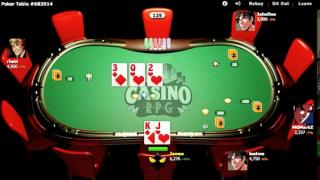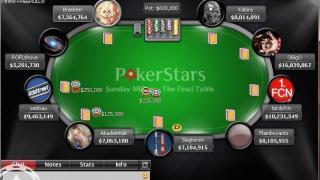Memory makes us human. No other creature can, with the flick of a neuron, revive the past, reignite old passions, reconvene special moments and treat these ephemeral visions as though they were real and palpable - not fleeting phantasms or illusions. Without a past, there could be no present.
For the poker-playing members of our species, our memories are precious weapons. We recall the patterns of actions of particular opponents. We remember the bozo in the Hawaiian shirt who dangerously overplayed his hands, the grizzled old codger who turned out to be a bit trickier marked cards than we first thought and, of course, we can rerun the vision of that sweet young thing in the cut-offs who ... ??? ... now what did she have that hand when she kept leaning over toward me ...?
And, of course, we need these "remembrances of things past." Our bankrolls depend on our memorial abilities. If we don't use them, we'll lay down the best hand against the bozo, get trapped by the old codger and dump (perhaps willingly) our entire stack into the lap of Sweetums.

Where am I? Where's my brain medicine?
Memory is very complicated and, so, here comes another of "the professor's" short lectures - poker lessons included.
First, we don't remember things we didn't pay attention to. In a fascinating study, while people were analyzing the video replay of a basketball game, a woman twirling an umbrella walked across the screen.
More than half the viewers never noticed her. Of those who did, many couldn't recall an umbrella. But if they were warned that something unusual might happen, they saw her and the umbrella.
Poker Moral: Watch what is happening around you at the table. Try not to get too absorbed in one part of the game because you will miss other information that may turn out to be important later.
This is particularly true when playing online, where it is easy to get distracted and not notice who actually put in the first raise. It is an especially important factor when playing multiple tables.
Second, we don't remember things with anything approaching accuracy. In fact, human memory is quite dreadful. We think that we know what we saw; we believe in our recollections, but the data show otherwise.

He was a short man with green hair, wearing pants on his arms if I remember correctly.
Poker Moral: Don't trust your recall of particular hands. In fact, if you don't believe me, try this. Write down all the details of a recent hand you played. No "baby" hands please ("I raised with AA; he called with KK"). Pick a hand that had some play to it, with a raise or two and more than one caller. Try to lay it all out with enough detail so that someone else would know what happened.
See what I mean? Not easy, was it? Perhaps now you understand why you online mavens keep clicking on the "last hand" button. I know I do, if only to assure myself that I really processed what was happening.
Third, emotions will affect your recall. Sometimes they are helpful; others not so. An event that is poignant and significant tends to be recalled accurately.
I once lost a huge three-way pot (well, huge for the level I play, a tad over $5,000) when my red aces (against KK and the black aces) got leveled by runner-runner clubs. I recall the setting, the table, the other players; I still see the cards with a crystalline vision (although, admittedly, the size of the pot may have grown with the telling ... I can't recall ...).

I was surrounded by crocodiles ... I can't remember a thing!
Actually, some of this effect is due not to a disrupted memory, but to an inaccurate or inappropriate interpretation of what happened. If you were frightened, angry or upset you're likely to mischaracterize what transpired so it fits with your emotional state. Intruders become bigger and fiercer; attack dogs grow more teeth.
Poker Moral: Don't misinterpret your opponents because you're upset. There is an understandable tendency to think that someone who sucked out on you is a terrible player. He may be. He may not be. But don't let the memory of that hand control how you interpret his actions in the future.
Fourth, memories are fleeting and what remains in our mind's eye is often a distant depiction of the truth. We recall the convenient; we twist events of the past to suit the present and misrepresent history to smooth the future.
Poker Moral: Don't trust your memory of how much you won/lost in any session more than few hours old. Don't believe the tales you tell yourself about how you played a hand, toyed with a table of tough Vegas regulars or dealt with a losing streak of epic proportions. Don't always believe your personal myths of mucked monsters, called bluffs, escaped traps.
Some of the tales you tell yourself may be right but, probably not. An awful lot of people can't recall whether they saw the movie or read the book ... or just heard the plot described by someone else.

Zen and the art of record-keeping.
Author Bio:
Arthur Reber has been a poker player and serious handicapper of thoroughbred horses for four decades. He is the author of The New Gambler's Bible and coauthor of Gambling for Dummies. Formerly a regular columnist for Poker Pro Magazine and Fun 'N' Games magazine, he has also contributed to Card Player (with Lou Krieger), Poker Digest, Casino Player, Strictly Slots and Titan Poker. He outlined a new framework for evaluating the ethical and moral issues that emerge in gambling for an invited address to the International Conference of Gaming and Risk Taking.
Until recently he was the Broeklundian Professor of Psychology at The Graduate Center, City University of New York. Among his various visiting professorships was a Fulbright fellowship at the University of Innsbruck, Austria. Now semi-retired, Reber is a visiting scholar at the University of British Columbia in Vancouver, Canada.







